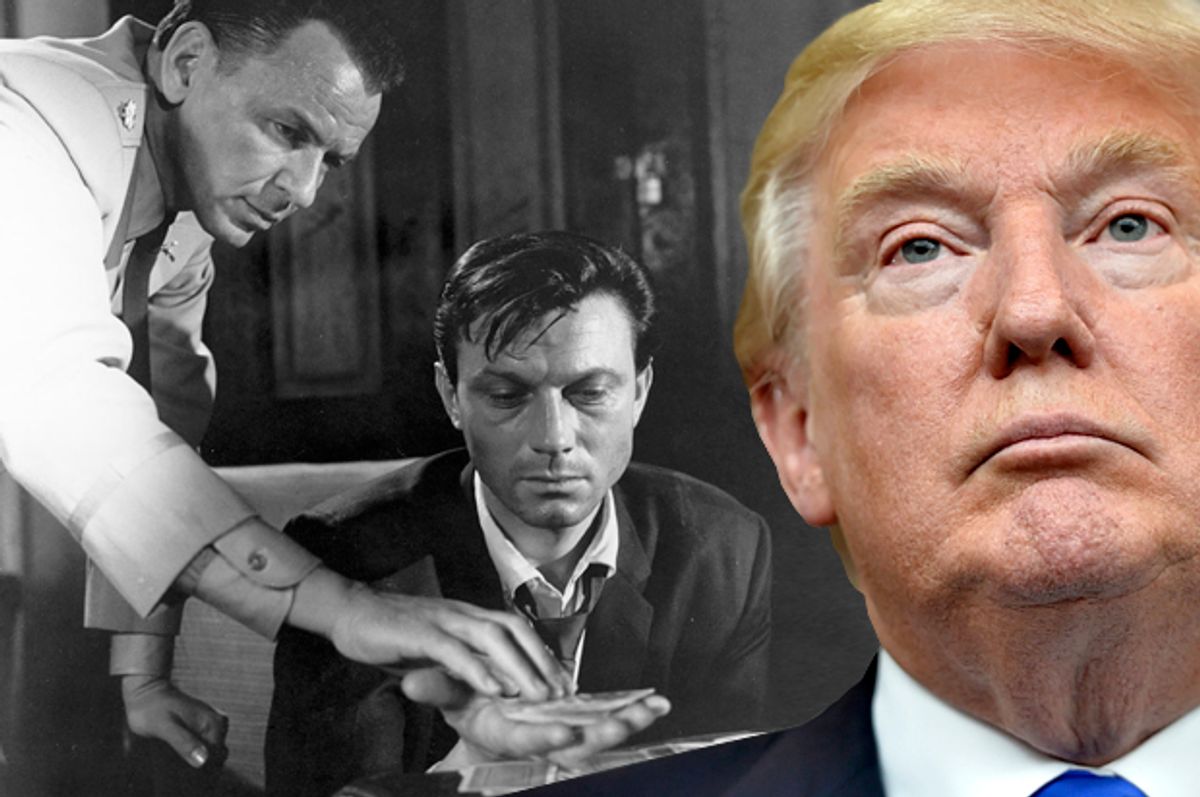Last week, Robby Mook, Hillary Clinton’s campaign manager, said we should ask “real questions" about whether Donald Trump "is just a puppet for the Kremlin.” By that time, Audible.com was already giving away free audiobooks of "The Manchurian Candidate," Richard Condon's 1959 book (transformed into a classic thriller starring Angela Lansbury and Frank Sinatra in 1962 and a worse remake with Denzel Washington and Meryl Streep in 2004) about communists controlling an American presidential candidate.
Hmm. Trump’s advocacy of dismantling NATO over unpaid bills, his continuous and effusive praise of former KGB chief Vladimir Putin (amply reciprocated), his bizarre request of Russia to hack Hillary Clinton's emails, his coming perilously close to supporting Russia’s annexing of Crimea, and his campaign’s redaction of the Republican platform plank in support of arming Ukraine against Russia can’t help but raise suspicions of a hard quid pro quo between the Trump campaign and Russian government. Donald Trump Jr. has said outright that Russians finance much of Trump’s empire, which is also hugely in debt to the Bank of China, while his father continues to hide what we might learn from his income tax returns.
Then there's former campaign manager Paul Manafort's lobbying for Russian oligarchs and the deposed Russian-allied Ukrainian president (all former big-time communists), while Trump foreign policy adviser Ret. Army Lt. Gen. Michael Flynn takes money from — and appears on — RT, the English-language cable-news network that beams Russian propaganda around the world.
To be clear, I'm not a Trump-style conspiracy theorist. I'm not suggesting that Trump has somehow been secretly brainwashed by communists; he isn't “programmed” to do anything but run his mouth and demagogue the election. Hair wash, yes. Brain wash, no. (Or as Eugene McCarthy said, after George Romney’s 1967 claim that the military “brainwashed” him in Vietnam, “a light rinse would have been sufficient.”)
But some "Manchurian Candidate" themes resonate powerfully in this year's campaign. Condon exposed the cynicism behind right-wing politics for the Cold War Eisenhower years and chillingly his book's narrative applies today. By articulating how “brainwashing” symbolizes the mass process of humiliation and repetition that the American working-class experiences at the hands of cynical right-wing leaders, the book and film anticipate a time when the radical right subverts American democracy.
Condon’s page-turner features the right-wing mastermind Eleanor Iselin, a red-baiting Republican senator’s wife who works hand in glove with the Kremlin. During the Korean War, Russian and Chinese scientists brainwash a group of American POWs so that they provide Eleanor with an assassin, her son Raymond Shaw, to unwittingly murder his mother’s enemies while in a hypnotic state and eventually turn the White House over to an alliance of right-wingers and communists.
Before Trump's candidacy, President Ronald Reagan’s sale of arms to Iran and President Richard Nixon’s and Secretary of State Henry Kissinger’s idolization of Mao, the book called attention to a worldwide power elite that, regardless of surface ideology, work in cahoots. Like Trump today, members of this elite see ideology solely as a means of gaining power. It's no accident that Trump has changed his political party at least six times.
"The Manchurian Candidate" uncannily anticipated the Trump-Putin bromance. Explaining the affinity between McCarthyite Republicans and Kremlin operatives, Condon, with his signature iconoclasm, wrote that red-baiters and reds alike share “the conviction that the Republic was a humbug, the electorate rabble, and anyone strong who knew how to maneuver could have all the power and glory that the richest and most naïve democracy in the world could bestow.” Six decades later Trump and Putin thrive by convincing resentful voters to embrace fact-free realities. “Paranoiacs make the great leaders,” Condon wrote. “Resenters make their best instruments.”
Fringe conservatives are more prone than impassioned liberals to becoming “Manchurian candidates” because liberals do not think the government of the republic is a “humbug.” The right, distrusting of government, does not see the dangers of toying with it. After all, McCarthyism ultimately undermined U.S. national security by forcing the most capable diplomats out of the State Department on trumped-up charges, leaving no one to check the folly of the Vietnam War.
Like the brainwashing of soldiers in "The Manchurian Candidate," Trump and the right hold the media and electorate captive through verbal humiliation and repetition. It is not Trump who has been brainwashed. He is not the Manchurian candidate. The American people are.
The communists humiliate Raymond to such a degree that he can only find peace in totalitarian control. Similarly, Trump’s economically and culturally humiliated working-class heroes believe in a leader who believes in nothing.
As a former Hollywood Disney publicist who promoted "Dumbo," "Fantasia" and many other golden-age Dream Factory products, Condon saw the dangers of Hollywood PR applied to politics. For instance, Eleanor picks 57 as the number of communists in the State Department because “Heinz 57” made that number resonate. The notion that someone could perform a total “brainwashing” as depicted by Condon has long been debunked by experts, but the phrase evokes the malign influence of mass PR first identified in the 1950s.
Despite its dystopian theme, Condon's novel offered a resolution that the film versions left out: reprogramming the assassin.
In the 1959 book, Raymond is programmed to kill the 1960 Republican presidential nominee so that his stepfather, vice presidential nominee Senator Johnny Iselin, can blame the Soviets, be elected president and then rule together with the Soviets.
In the novel, Raymond’s comrade, Major Ben Marco (the Sinatra character), not only discovers his brainwashing and recovers his sanity. He believes his own memory loss reflects the crisis that America is in. To thwart the conspiracy, Marco reprograms Raymond to shoot his mother, stepfather and self.
Can we Americans reprogram ourselves to a better end?

Shares